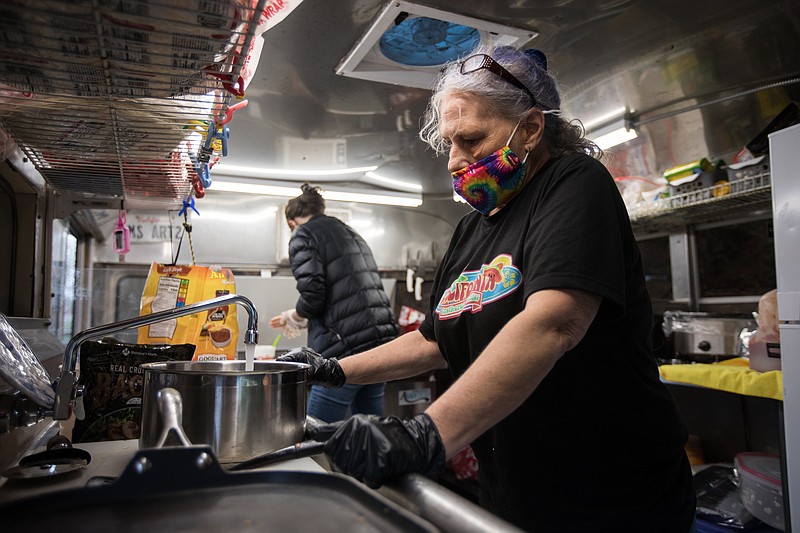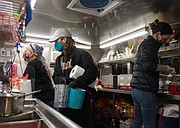In 2010, Jim Masiella had a stroke and was looking for a new gig. He decided to get out of the brick-and-mortar restaurant business and bought a food truck in 2012 after seeing an ad online for a truck in Nebraska. Today, Masiella and Elaine Essary co-own California Smothered Burrito, which offers a variety of Southwest favorites.
"There weren't many trucks out there then, and I flew up there and fell in love with it. It wasn't just a van - I wanted something unique," he says. "It was a peanut truck and had a sign on the back that said, 'Nuts.' I drove it back thinking how appropriate that was."
One of the first food truck operators in Chattanooga, Masiella dealt with a different environment then than what he faces today. Then, people tended to equate all food trucks with the vehicles that travel from business to business selling simple premade sandwiches and bags of chips. He had to convince eaters that the quality of his food rivaled that of finer restaurants, just served out of a mobile kitchen.
It has taken time, but now he only takes the truck to private-owned locations that have asked him to come and have guaranteed at least $500 in sales, which at $10 a burrito means at least 50 orders.
"Now, people call us to come to them," Masiella says.
When he first set out, he also had to convince the local brick-and-mortar restaurants that the trucks were not a threat.
"We offer quick and easy. People who like to make plans for a nice evening on a date aren't coming to us," Masiella explains.
The pandemic slowed business a bit because for many months there were fewer weddings, which are typically big business for food trucks, and many downtown Chattanooga offices sent people home to work, but Masiella says his California Smothered Burrito truck has by no means been idle. In the last year, in addition to its regular business, the truck has also served food to health care and frontline workers, and first responders following the tornadoes that hit the area.
On a cold and rainy day in mid-March, his crew of three traveled to St. Jude Catholic School to serve lunch to the staff. Serving was to start around 10:45 and the crew arrived about 90 minutes before to crank up the generator to power the truck and to begin chopping vegetables.
Some days are busier than others, but Masiella says the truck and crew can turn out about 100 burritos an hour. Because the truck has limited space, however, once the supplies are gone, that's it for the day.
While he says he loves things like weddings and private parties - and never sets up shop at events that require a fee to be there - his best day ever sales-wise was a recent StumpJump, the annual 50-kilometer trail run hosted on Walden's Ridge.
In many ways, Masiella and Lisa Dunny represent two sides of the same coin when it comes to the restaurant business and food trucks. On a recent afternoon, the two friends found themselves gathered at Chattz Coffee on Broad Street talking about what it's like to operate a food truck. Dunny is the owner of Chattz and Spill the Beans, a mobile unit which specializes in, you guessed it, coffee.
While Dunny has both a brick-and-mortar location and a mobile truck, Masiella has only the truck and says he prefers it that way after years of owning and operating standalone locations.
Dunny was in real estate when she decided to buy her truck in 2013 and launch Spill the Beans. She used to buy her roasted beans from Chattz Coffee. Then, one day she showed up to get her weekly supply and the owners asked if she'd be interested in buying the business, which included a storefront coffee shop and small cafe.
The larger footprint, both in terms of the location and the offerings, took some getting used to.
"This is actually two businesses," she says, looking around the sit-down coffee shop. "We have the roasting side and the cafe, and here we do food. That is a beast I'm not used to."
Masiella has worked in the food industry most of his life, including owning and operating Bear Hollow on Monteagle Mountain. He also owned a Mexican restaurant in Denver and Masiella's Italian Restaurant and California Juice Bar and Eatery in Chattanooga. He decided years ago that standalone eateries were not for him.
"I'll never own a brick-and-mortar place again," he says. "The hours, the costs, the water bills, the electrical bills, rent."
Essary says the costs to buy, build out, repair and get the California Smothered Burrito truck wrapped with its bright, friendly design was around $40,000. "Plus the generator was about $5,000 and we just spent $7,000 on a new engine. It is an old truck," she adds.
But those are one-time costs, so the biggest ongoing costs are labor and supplies.
It's a different story with Chattz.
"I'd say it costs roughly about 40% more to operate Chattz," says Dunny.
Still, she says the opportunity to own the coffee shop was too good to pass up, adding, "The two are completely different. With the truck I can set my own time and hours, and [at the shop] I have more employees and things to worry about."
Dunny's truck is a regular at the Chattanooga Market and, when they have them, UTC football games. Because other vendors need their coffee to get going in the morning, she often arrives earlier than others, she says.
Whether in the truck or in a brick-and-mortar location, both she and Masiella say the work and routines are not much different than in any other commercial kitchen. It's not unusual for kitchens to be small and cramped with cooks standing elbow to elbow, and food trucks like the 59-square-foot burrito truck can certainly be that way with two or more people prepping the food.
What is different is that the trucks are often impacted by things like weather and parking issues, such as the slopes of uneven ground.
"We do deal with heat, rain, snow and things like that, and I won't go out in lightning," Masiella says. "We have tents, or the places or businesses we go to often do, and we have air conditioning on the truck and in the winter the cooktops warm things up."
His truck operates year-round, with January and February being the slowest months.
"We average between four and sevens days," Masiella estimates overall.
When it comes to the staff's livelihood, he says they take home anywhere from $200 to $600 a week depending on tips.
"Weddings are the best," he says.
Things like buying supplies and inventory planning are also no different, though in fact, "food costs are more predictable and the events are shorter" with a food truck, Masiella says.
"And, we go where the people are. All of the food prep and cooking is done on the truck."

